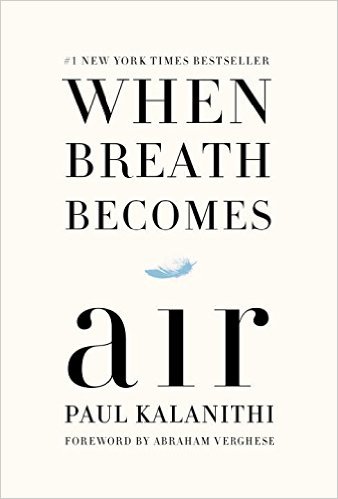
Diagnosed with advanced lung cancer, author and neurosurgeon Paul Kalanithi chronicles his illness and death in an emotionally moving book, When Breath Becomes Air, which is currently topping the New York Times bestseller list. Our editor Shivani Maheshwari shares her view:
There are not many books that leave you as unsettled as Paul Kalanithi’s When Breath Becomes Air. It gets difficult to hold back the tears at the end, as Kalanithi battles time to chronicle his illness and death. Diagnosed with stage IV lung cancer at the prime of his life (he had never smoked), at the pinnacle of his career, his writing leaves you overwhelmed with questions about life, and more so about death, premature death.
“What makes life worth living in the face of death? What do you do when the future, no longer a ladder toward your goals in life, flattens out into a perpetual present? What does it mean to have a child, to nurture a new life as another fades away? These are some of the questions Kalanithi wrestles with in this profoundly moving, exquisitely observed memoir,” mentions the cover of the book.
Kalanithi, a second generation Indian American, was a neurosurgeon and writer. He graduated from Stanford University with MA in English literature and then studied medicine and neurological surgery. Within a decade he had risen to the apex as a neurosurgeon with his immense capabilities and exemplary compassion.
In the first part of the book, titled In Perfect Health I Begin, he recounts his early days and his meteoric rise as a neurosurgeon. The second, Cease Not Till Death, is a poignant account of his heroic struggle with advancing cancer. He breathed his last in the same hospital, where he gave life to countless patients.
Paul Kalanithi died at the age of 36, while writing this book. He is survived by his wife, Lucy, and their daughter, Elizabeth Acadia, whom they decided to have after he was detected with cancer.
After Kalanithi’s death, his wife, Lucy, gathered herself together to fulfil his last wish of getting the book – which by the end, he wrote with gloves on because his hands were sore - published. In the emotional, poignant epilogue, she narrates his worsening condition, his last few days when he was too ill to write, his final moments and his stirring funeral. “Paul died on Monday, March 9, 2015, surrounded by his family, in a hospital bed roughly two hundred yards from the labor and delivery ward where our daughter, Cady, had entered the world eight months before. Between Cady’s birth and Paul’s death, if you’d seen us sucking on ribs at our local barbecue restaurant and smiling over a shared beer, a dark-haired baby with long eyelashes napping in her stroller besides us, you’d never have guessed that Paul likely had less than a year to live, nor that we understood that.”
When Breath Becomes Air lingers long after you’ve closed the book and stacked it on your shelf. It is like watching a movie where the scenes hang about in even after the last credit has rolled off the screen. Such is the impact of Paul Kalanithi’s words.
“Paul was buried in a willow casket at the edge of a field in the Santa Cruz Mountains, overlooking the Pacific Ocean and a coastline studded with memories – brisk hikes, seafood feasts, birthday cocktails.”
When Breath Becomes Air, posthumously published in January 2016 by Random House, is currently topping the New York Times bestseller list and should be read not only by medical professionals and those touched by cancer, but by all who wish to celebrate – both life and death.
Extract
“I returned to Paul’s bedside. He looked at me, his dark eyes alert above the nose bridge of the BiPAP mask, and said clearly, his voice soft but unwavering, “I’m ready.”
Ready, he meant, to remove the breathing support, to start morphine, to die.
The family gathered together. During the precious minutes after Paul’s decision, we all expressed our love and respect. Tears glistened in Paul’s eyes. He expressed gratitude to his parents. He asked us to ensure that his manuscript be published in some form. He told me a last time that he loved me. He attending physician stepped in with strengthening words:
“Paul, after you die, your family will fall apart, but they’ll pull it back together because of the example of bravery you set.” Jeevan’s eyes were trained on Paul as Suman said, “Go in peace, my brother.”
Here is another excerpt from the book in the New Yorker : My last day as a surgeon
Image credit: Amazon author page and book page.







